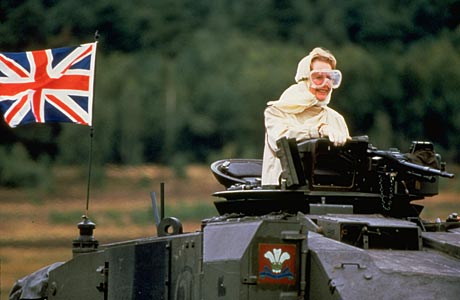
Margaret Thatcher’s Greatest Achievements
Margaret Thatcher’s funeral and all the media interest has released my inner Tory Boy, even though I once won the mock election at school with our ‘New Communist’ party (on the eve of New Labour’s victory in 1997). Although I may not agree with every policy her government implemented, this post will mostly ignore the criticisms of Thatcherism and instead focus on her undoubted achievements, many of which are inter-related. Anyway, while people try to attribute such things as unemployment and the decline of the coal mining industry as legacies of Thatcher’s government, my view is that these were inevitable and could have been far worse without her reforms. Indeed, by the end of the Thatcher era there was less unemployment than under Labour in 1979, while the previous Labour government closed far more mines than she ever did and it was their relationship with the Trade Unions and general self-interested economic incompetence that ruined British industries in the first place.
When Margaret Thatcher entered Downing Street in May 1979, she took control of a country that was in a permanent state of decline, while the Winter of Discontent, the previous coal mining strikes, the three-day week, rolling blackouts, rubbish piling up in the streets and even the dead being left unburied had clearly illustrated that the unions were in control of the country and that Britain was a shadow of its former self, viewed with pity by the rest of the world.
Margaret Thatcher had a particularly consistent and clear political philosophy with a deep conviction that the country had been run the wrong way. This combined with her supreme self-confidence and tenacity meant she was willing to make unpopular decisions, take risks and do the things she thought were necessary to enable people to be free and create wealth and thus change the fortunes of the nation. In effect she did not want government to continue to try to run (or rather crush) Britain, but let the British people have a go again.
The Falklands War
In essence, the successful campaign was a virtuous war fought against an aggressor in order to defend Britain’s interests and support a people’s right to determine how they are governed. It was Britain’s first military victory since 1945 and made Britain feel proud, strong and assertive again. The relatively swift victory and the steadfast nerve Thatcher had displayed in acting so decisively captured the world’s attention and turned her into a respected stateswoman on the international stage.

Right to Buy Scheme
Through the right-to-buy scheme Margaret Thatcher gave some of the poorest and previously disenfranchised people in society a way to buy their own homes. Council tenants who had never even thought of owning their own homes were free to become homeowners, thus letting aspirational, hard-working people improve their security and increase their wealth by owning property and having more of a stake in society.
Supply Side Reforms and Entrepreneurship
Thatcher’s government eventually smashed the grip the public sector and government held over the country and created a far better environment for entrepreneurial people to thrive. When she became prime minister in 1979, the top tax rate was a pernicious 98%; the bottom rate was 65%. However much or little you earned, you were paying most of your money in taxes, making any business activity or desire to be self-sufficient very difficult. When Margaret Thatcher left office in 1990, the top tax rate was down to 40% and the bottom tax rate was 25%. By cutting taxes and regulation people could keep and spend more of their own money, businesses thrived and the British economy was revitalised.
The Thatcher years saw the establishment of hundreds of thousands of small businesses that in modern Britain form the backbone of our economy. The previously entrenched class system was weakened, more people moved into the ‘middle class’ and the previously impossible concepts of upward mobility and ‘bettering yourself’ became common. At the end of her time in government there was far more respect and reward for hard work, enterprise and risk.
Foreign Investment
Margaret Thatcher recognised the need to harness the power of the global market rather than try to hold it back and her policies changed the business environment sufficiently to make Britain a favoured destination for foreign investment in Europe. Privatisation, in particular, helped open up the economy and provided many opportunities for foreign investors. Taxes were lower, strikes were down, productivity and GDP growth were much improved and foreign investors were now queuing to get in as opposed to fleeing and avoiding the country as they had previously done. This trend was symbolised by Nissan’s groundbreaking investment in the North East of England and statistically FDI inflows tripled to $30.5 billion in 1990 from $10.1 billion in 1980, according to UNCTAD.
She also got the government to partner with the delivery strengths of the private sector to implement key infrastructure investment projects. Canary Wharf, one of the country’s first enterprise zones, was one such project that through tax concessions, incentives, and reduced regulations attracted high levels of private sector investment. Over 100,000 people now work at Canary Wharf which has helped to regenerate a large part of East London and attracted a lot of foreign business and investment to the UK.
Big Bang, in 1986, was essentially about deregulating the Stock Exchange and was so called because the reforms were expected to dramatically increase market activity. It enabled 100 per cent outside ownership of member firms, so that London could operate on a modern, properly capitalised basis as an international financial centre. The plan was to reprise the City’s golden age, when London was the world’s greatest financial centre, disbursing capital and credit around the globe, before the guns of August 1914 changed everything. The plan came to fruition, neither Frankfurt or Paris mounted a credible challenge to London as the top European financial centre and by the new century, London was ahead of both New York and Tokyo in global terms, with the City becoming a real cash cow for successive British governments.
Defeat of the Trade Unions
When Thatcher first came to power she knew that her primary target would be the organised labour movements which had wrecked the economy and made the country ungovernable, in particular the National Union of Mineworkers (NUM), up to 1m strong, led by Arthur Scargill.
The NUM’s strike tactics were getting more militant, but previous Labour and Conservative governments had only made the problem worse by cowing to their demands. A showdown was inevitable, although Thatcher had to bide her time until when the NUM went on strike in the winter of 1984-85, ostensibly about pay and conditions, but they really intended them to lead to mass discontent turning to violent regime change.
Mrs Thatcher successfully faced down and outlasted the miners, arguing that it was a battle for the right of management to manage over the arbitrary use of union power, in the process reforming union procedures to allow the democratic method of secret ballots, banning secondary picketing and lessening the possibility of coercion.
The number of strikes went way down and her victory effectively ended the union problem for good. By defeating the strikes Margaret Thatcher sent a message loud and clear that striking won’t work anymore and for the British economy it was the most important thing she ever did. The unions try to claim that Thatcher destroyed manufacturing in Britain, however British factories increased output by 7.5 per cent during her premiership (according to the Office for National Statistics).
Privatisations and Share Ownership
The economy was further transformed with the series of privatisations that took place in the 1980s. Thatcher swept away previous state monopolies and transformed daily life in a way we now take for granted. Suddenly, people had cheaper and more efficient power supplies and businesses could drastically cut costs.
She privatised industries through selling shares to the public so that millions of Britons became the first in their family to own stock in a company. Previous loss-making companies such as British Airways and Rolls Royce soon became profitable allowing the public to receive income and capital from their shareholdings and meaning these companies also now paid taxes on their profits rather than the taxpayer having to pay to keep them afloat.
Mrs Thatcher’s privatisation revolution spread around the world. The post-communist countries embraced it and by 1996 Russia had privatised some 18,000 industrial enterprises. India dismantled the Licence Raj (a legacy of British Fabianism) and unleashed a cavalcade of successful companies. Across Latin America governments embraced market liberalisation. Whether they managed well or badly, all of them looked to the British example.
The End of the Cold War
Mrs Thatcher’s biggest legacy has to do with the spread of freedom, the defeat of totalitarianism in its most vicious form in the Soviet Union and the revival of a liberal economic tradition that had gone into retreat after 1945. Many things caused the collapse of the Soviet Union in 1989, but the clarity of Mrs Thatcher’s beliefs and the influence she gained on the world stage was a vital factor.
She was the first British politician since Winston Churchill to be taken seriously by the leaders of all the major powers. She was a heroine to opposition politicians in eastern Europe, mobbed wherever she went behind the Iron Curtain and lauded as a herald of freedom. She formed a triumvirate with Ronald Reagan and Pope John Paul II to engineer the downfall of Soviet communism.
Mrs Thatcher became Prime Minister before Reagan was elected President and her liberal economic example made it possible for Reagan to then become President. Thatcher was a staunch Cold War warrior and Reagan often looked to her for guidance and leadership in how to deal with the Cold War. However, it was her diplomacy and friendship with Gorbachev combined with her influence over President Reagan that meant talks were started to end the Cold War. Therefore, not only did she save Britain from becoming a third-world satellite state of the Soviet Union, together with Reagan she hastened the end of the Soviet Empire without starting any actual wars and helped to promote new thinking in the Kremlin.
Conclusion
Thatcher inherited a legacy of socialist state planning and crippling taxation, both of which hugely reduced Britain’s international competitiveness. The political class had also been in thrall to union power and the country faced constant threats of paralysing industrial action. Britain was mired in defeatism, fatalism and negativity with the IMF loan under the Callaghan administration making Britain an international laughing stock.
Margaret Thatcher won the argument for a new kind of Britain and despite having to make unpopular decisions she was victorious in three elections, shifting the centre of gravity of British politics dramatically to the right in the process. So much so that the New Labourites of the 1990s concluded that they could only rescue the Labour Party from ruin by adopting the central tenets of Thatcherism with Tony Blair declaring that “the presumption should be that economic activity is best left to the private sector”.
Her policies aimed at reducing the size of the state, cutting tax and empowering the individual, combined with deregulation, privatisation and much needed reductions in union power, created the conditions for the booming enterprise economy of the 1980s. The fact that capitalism and democracy are today seen as the best and only viable forms of political economy (I think the term ‘social democracy’ is ultimately a bit of an oxymoron) is largely because Margaret Thatcher fought her battles, won the arguments and became an inspiration for other countries around the world.
Further reading:
Why Generation Y And The Young Continue To Have It Worse Than Their Parents
